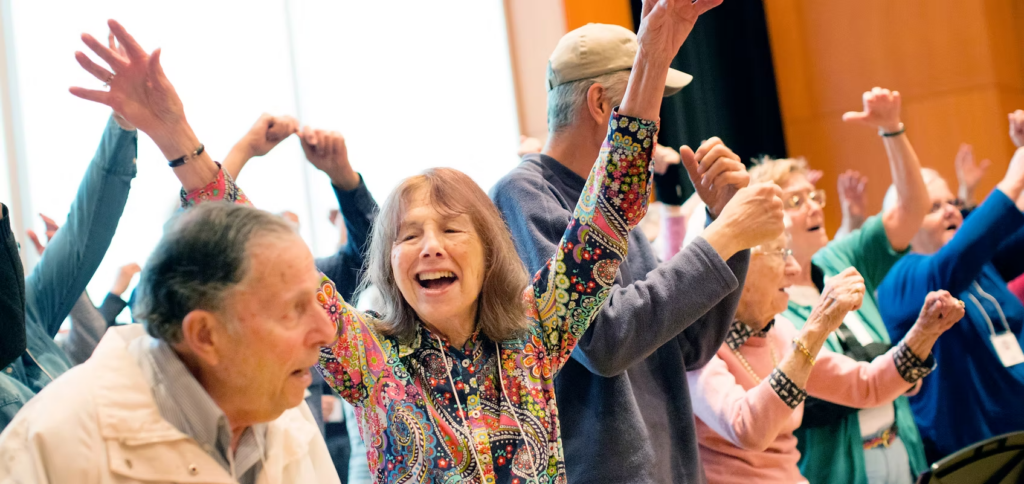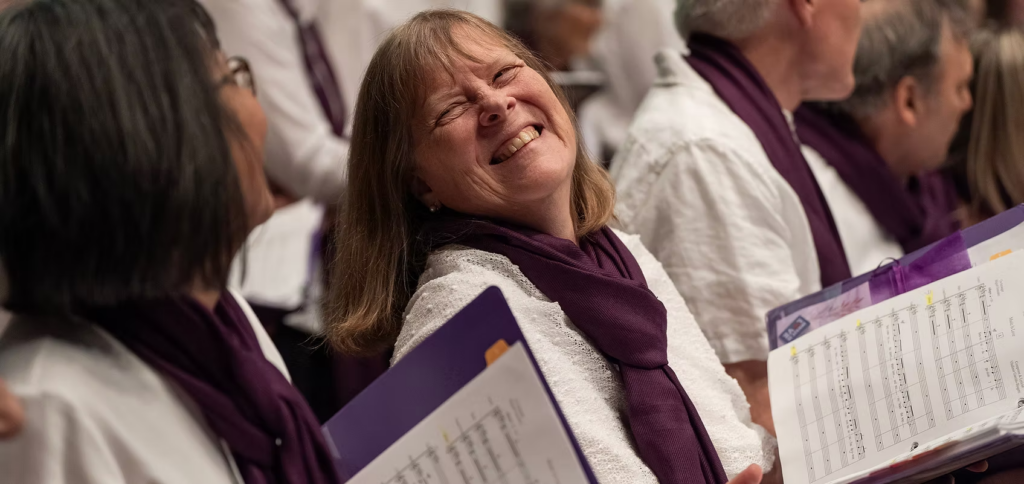Scene: It’s December 2023. Reggie Holmes, 72, faces the audience at a choir concert. She’s been singing since she was a baby, but things have changed.
“I turned around to apologize to the guy behind me. I said, ‘I just want to sing, but it will sound really bad,’” Holmes says.
“My voice was lovely, but Parkinson’s stole that from me.”
In the past couple of years, she’s somewhat reclaimed that voice—in large part thanks to Parkinsong Choir in rural Washburn, Wisconsin. Last year, it sprouted from a network of choral groups across the Midwest (and world) for folks with dementia and their caretakers.
Eyleen Braaten is the executive director of that parent network: Giving Voice, based in Minneapolis, Minnesota. In it, she sings with her dad, who has dementia.
“[It] is an opportunity to have a human-centered approach to creating programs that really bring wellbeing to people that are often told that they don’t have too much to give,” Braaten says of Giving Voice, which offers free toolkits for communities looking to start their own choirs.

Getting your song on is proven to boost memory and overall health, especially in cases of dementia, Alzheimer’s and Parkinson’s. Polls show music (even just listening) is especially remedial with older adults. Music is social. Active. Even scientific.
It’s something Stephanie Johnson knows well. In 2009, the board-certified music therapist founded Music Speaks and has worked with clients struggling with communication, memory, learning, early development, mental health … the list goes on.
“If the brain is not operating in a way that it used to, due to a physical traumatic injury or a stroke or Parkinson’s or dementia, we can incorporate music and help pull the information from a healthy part of that brain back into processing, whether it be speech or motor or cognition,” Johnson says. She’s helped nonverbal clients sing, even when speech remains difficult.

Think of the alphabet, she says: Would you have been able to memorize those 26 letters, in order, without that kindergarten-famous alphabet song?
Johnson’s team of music therapists works across the Midwest and beyond, adjusting song tempo and dynamics to meet client needs. But folks without this care access, a local choir, or even a diagnosis can still reap musical benefits.
Anyone can queue up a beat (may we suggest our Essential Midwest playlist?) and let the brainwaves work their magic.
“Most often, the western world thinks of music as a song or a genre or an artist,” Johnson says. But what about music as healing? As identity, recovery?



Singing, especially with Parkinsong Choir, is a source of joy, friendship, and belonging for Holmes: “My voice is not what it used to be . . . It’s still kind of harsh and I have a vibrato you wouldn’t believe,” she says, laughing.
“But I can sing. And it’s beautiful.”
Midwest Giving Voice choirs:
-
Illinois
-
Indiana
-
Iowa
-
Minnesota
Amazing Grace Chorus | St. Paul
Suab Zoo Siab (Hmong Folk Choir) | Brooklyn Center
Building Bridges Choir | Granite Falls
Elevating Voices | Perham
Resounding Voices | Rochester
Singing Hills Chorus | Mankato
Victory Chorus | Duluth
Voices of Joy | Benson
The Memory Lane Singers | Coon Rapids
Forget Me Notes Chorus | Winona
Connecting Voices Chorus | Minneapolis
Connecting Voices Chorus | Lino Lakes
-
North Dakota
-
Wisconsin
Coulee Region Giving Hearts Choir | La Crosse
Stand in the Light Memory Choir | Eau Claire
On a Positive Note Chorus | Neenah
Parkinsong Choir | Washburn
